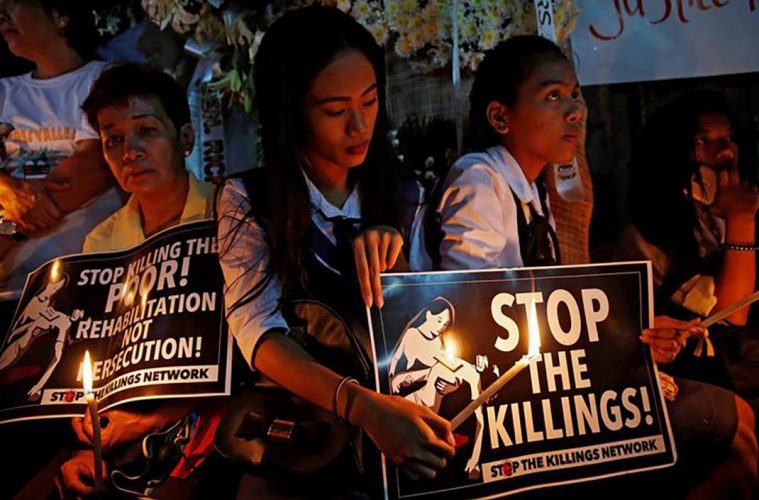Philippines President Rodrigo Duterte’s stringent drug policy has put him under international scrutiny since taking office in 2016. The International Criminal Court (ICC) has recently began the process of investigating Duterte’s reign, calling into question matters of human rights and civil liberties. International attention on the issue tends to focus on the predominantly-male drug users that are targeted by the police. However, an interesting focus – one that tends to go unseen – is how women and children of poor urban areas suffer indirectly from the policy.
Duterte’s infamous “War on Drugs” has captured international attention for its approach towards reducing crime rates. Through this campaign, police are ordered to target and kill suspected drug dealers. It has gone as far as encouraging members of the public to follow suit. This has given rise to police operations as well as vigilante squads that target suspected criminals. It is through this process that fear is instilled to make law-abiding citizens feel safe. This policy was demonstrated to reduce crime in the Philippines, as was done in Davao under Duterte’s two-decade rule as mayor.
As feminist scholar J. Anne Tickner suggested, looking at the micro-level of security agendas can show the gendered nature of global politics. Duterte’s drug policy, one aimed at reducing criminal activity, in actuality contributes to more insecurity in the micro-level. There have been hundreds of cases where women are abruptly left with no source of income due to the sudden killing of their spouses or providers. This leaves them, along with their children, in an even more vulnerable position in urban areas of poverty.
The lack of judicial proceedings contributes to this sense of insecurity. By bypassing the system of law, the number of unlawful killings skyrockets. This process reflects what Tickner would call a “masculine” concept, where power is exercised through its severity. Concepts of self-help and cooperation, which are deemed traditionally “feminine,” are not used. However, these approaches would offer a safer, less gruesome alternative to battling crime. Instead, what we have is a policy that targets the urban poor, creating more vulnerability that extend to the women and children of these areas. Here, the wellbeing of the urban poor is sacrificed. What this policy provides is a broader sense of security, one so broad that it neglects the needs of its most vulnerable citizens.
Furthermore, this policy not only permits but even encourages the killing of any drug users, regardless of age. This puts children of the urban poor into helpless positions. The Duterte administration is seeking to lower the criminal age of children from 15 to twelve. Children of the urban poor are used in drug trade and trafficking by adults. This law would put these children at risk of death without recognition of the social-economic position from which their involvement arises. Duterte refers to these deaths as “collateral damage,” showing how top-security initiatives view their most vulnerable members as secondary. This policy assumes that through eliminating these drug lords, women and children will be safer. This fails to recognize the candid situations of these women and children due to their social and economic background.
This drug policy, one that is deemed as a national security initiative, strips the urban poor from government protection. Instead, they have the government to fear as a source of insecurity. Although Duterte’s policies are aimed at creating a safer country, the nature of its process overlooks the damage it creates for women and children. Even non-drug users feel the effects of this policy. This outcome shows the gender dynamics of the Philippines, where women are still very much dependent on men for their source of income. Until this dependency can be dealt with, the focus must be on ending this policy, where men, women and children become targets of their own government. On the macro-level, this policy gives the impression of creating a safer Philippines, one devoid of drug use and drug trafficking. However, it perpetuates the insecurities of the urban poor rather than deconstructing them.

